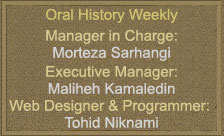| No. 498 | 3 August 2021 |
A Review of Memories of Masoumeh Khansari Bozorgi -1Memories of Jahād-e Sāzandegī, Relief, and Cultural Activities in SchoolMasoumeh Khansari Bozorgi is one of the most active women in the post-Islamic Revolution and the holy defense era. She began her activities in Jihad of Construction (Jahād-e Sāzandegī) and after starting the imposed war she attended the war support headquarters and then went to south of the country for relief, but her main activity in those years was to carry out cultural activities in schools. Jihadi activities in deprived areas of Tehran, Varamin and Shahriar, activities in war ...Review of the book "The Prince of My Land"Biography of a Martyr of Science Named Dr. Majid ShahriariThe book "The Prince of My Land" is written by Masoumeh Zeinali and its first edition was published under the supervision of the Office of Culture and Sustainability Studies of Zanjan Province and in Surah Mehr Publications (affiliated to Arts Center), in 404 pages and 1250 copies and priced at 80,000 Toman (Iranian currency) in 2021. In general, as the author mentions in her introduction: "This book is the life story of a man who, relying on genius, ability, and domestic scientific ...Oral History TeachingUsing Photos in Interviews and Memory BooksFollowing the series of articles in the field of "Training in Interview", which began with the articles "Good Start", "Ethics in the Interview" and "Characterization in the Interview", we now pay attention on to the topic of "Using photos in interviews and memory books." Photography is an independent art. Photos are usually published as photo books or displayed in galleries. The position of the photo has changed a lot over time. In the past, photography was dedicated to special occasions and such as pilgrimages, weddings, etc.Interview with retired Colonel Qassem Nematollahi-2Telecommunications is Like a Nervous System of the ArmyTelecommunications is the nerves of the military. Have you ever encountered people with upset nerves?! How are they?! Just as the nervous system transmits commands from the brain to the nerves, so do telecommunication systems deliver the commands of a commander to his subordinate elements. Telecommunications in war is like a chain of nerves for a human being. Without Telecommunications, the commander, the watcher and the artillery will be useless, and none of the commanders can do anything. Oral History Weekly Magazine Aims and Regulations
Oral History Weekly Magazine wishes to create a suitable place for thoughts and idea development; Its main field would be “Oral History” and subjects as telling & writing memoirs, writing diaries, travelogues, chronologies, and all other subfields of history which are presented in the form of news, articles, reports, notes, interviews and memoirs can be included. There is no limitation on the length of would-be-sent materials. Mentioning the name, academic background and email is necessary. Articles with complete references and bibliography are more credited and an abstract would quite helpful. Weekly is not about to publish any material consisting insults and libels about other people or anything that brings anxiety to public opinion. Weekly can edit and translate the received materials. The published articles and materials are only the writer’s ideas and Oral History Weekly Magazine has no responsibility about their content. |
 SABAH (70) Memoirs of Sabah Vatankhah Interviewed and Compiled by Fatemeh Doustkami Translated by Natalie Haghverdian Published by Soore Mehr Publishing Co. Persian Version 2019 *** Hover craft turned with more speed towards port. As minutes passed, the volume and small of the smog increased. When we reached the port, the hover craft did not land on the soil and stood in the water near the waterfront. The crew threw a few big pallets on the water and formed a path towards the waterfront. Then they guided the passenger quickly towards out. The pallets trembled under our feet and the water reached our knees and made us wet.    |
